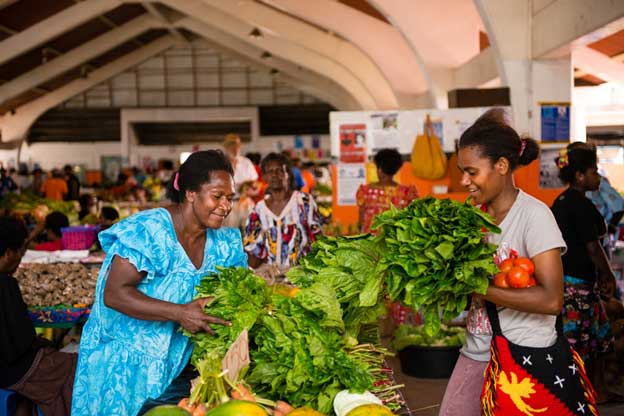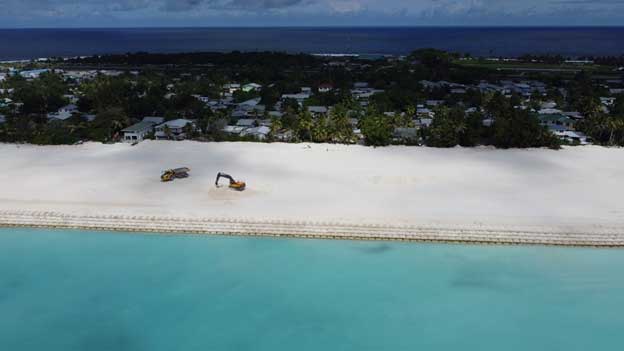SUVA, Fiji, Apr 12 (IPS) – The author is Resident Consultant, UNDP Pacific Workplace in FijiLet’s take a second to replicate on a crucial query: Within the decade because the Third Worldwide Convention on Small Island Creating States (SIDS3), what tangible progress have we made in addressing the challenges confronted by our SIDS?
These nations are bearing the brunt of the local weather disaster, regardless of their minimal contributions. Small communities that face an existential menace, not a distant fear. The time for incremental change has handed; with decisive motion required to stop the Pacific from changing into a cautionary story, and now not a paradise.
Thirty 9 UN member states and 20 affiliate members of regional commissions are labeled as SIDS and within the Pacific the UNDP’s workplace in Fiji covers 10 of those small islands on the frontline of a number of planetary crises.
Whereas the Pacific shares commonalities with its fellow SIDS, it should be famous that the area faces distinctive vulnerabilities that distinguish it from the small islands in Africa and the Caribbean.
Pacific SIDS have skilled progress in human growth, however persistent disparities stay. We’re seeing a backslide on gender equality – its worst decline in 20 years – with girls affected most in relation to positions of management.
Lower than seven p.c of Pacific politicians are girls, in comparison with 27 p.c globally, a determine that highlights the necessity for drastic change.

Revenue inequality stays deeply entrenched, each inside Pacific Islands international locations and when evaluating information from the Pacific towards its fellow SIDS in Africa and the Caribbean. Addressing this disparity requires a multifaceted strategy, together with a simply transition to wash and inexperienced power.
With oil nonetheless accounting for about 80 p.c of the Pacific’s whole power provide, and Pacific SIDS paying greater than every other area for one kilowatt of power, a decisive shift is required to extend the utilization of renewables from their current fee of simply 17 p.c – a should for the safety of our area’s Blue Financial system, and the monetary stability of many Pacific communities.
Let’s not dwell on these 10 years any longer, the refrain that rings throughout our Blue Pacific calls for motion. Let’s chart our course for the following decade and be certain that the next three gadgets are on the prime of leaders’ agenda when SIDS4 commences on 27 Might.
Local weather governance
The impacts of local weather change don’t discriminate. The fact of this ever-changing and ever-more harmful menace is an on a regular basis impediment for communities from Palau within the north to Tonga within the south, and each small island state in between.
To navigate this new regular, change-makers at SIDS4 should prioritize and advocate for strengthened local weather governance. Initiatives comparable to UNDP Pacific’s Governance for Resilient Improvement Mission provide a blueprint – fostering risk-informed, community-led resolution making to make sure that each growth alternative considers and builds resilience to our local weather’s ever-present impacts.
This give attention to local weather governance is now not non-obligatory for Pacific SIDS – it’s the cornerstone of a safe future.
We want not name for sympathy, somewhat we name for options.
We all know too that with the impression of local weather change changing into extra frequent and extra intense, adaptation is extra vital than ever. This urgency for adaptation is especially evident in Tuvalu the place projected sea degree rise will see greater than half of its capital Funafuti submerged by 2050.
For Tuvalu, adaptation is now not a alternative, it is a necessity. With restricted land and rising sea ranges, revolutionary options are paramount. The Tuvalu Coastal Adaptation Mission (TCAP) takes on even larger significance on this context.
By establishing new, greater land, and implementing science-based coastal safety, TCAP goals to safeguard communities and infrastructure in Funafuti, doubtlessly changing into the one liveable space of land by 2100 – and even 2050 based mostly on intensified local weather fashions. This challenge serves as a mannequin for coastal adaptation throughout the Pacific.
TCAP embodies this spirit, reimagining Pacific Island international locations to make sure they’re match for the long run, the place not solely land and livelihood are protected, however a future the place cultural custom and customized can proceed to thrive.

Future developments and digital
The geographical traits of Pacific SIDS, with broadly dispersed populations, create elementary challenges to digital connectivity. As Pacific SIDS navigate the triple planetary disaster of local weather change, biodiversity loss, and air pollution, know-how can function a instrument for a sustainable future, empowering communities and upholding human rights.
Whereas Pacific SIDS proceed to strengthen their ICT infrastructure, a crucial problem of guaranteeing everybody advantages from these developments stays. Unequal entry to know-how can deepen present inequalities, due to this fact developments in know-how and their use throughout the Pacific will be seen as a instrument to strengthen, not weaken, the area’s social cloth.
Whereas cutting-edge applied sciences – together with synthetic intelligence – provide revolutionary options, navigating the tightrope of planning for a digital future requires a nuanced strategy.
To unlock the complete potential of digital developments for Pacific SIDS, prioritizing inclusive digital governance methods is vital. This requires insurance policies designed round accountability, inclusion, and human rights, guaranteeing know-how strengthens, not weakens, the social cloth.
Because the world gathers for SIDS4 in Antigua and Barbuda, with the above in thoughts, let’s reimagine the narrative for Pacific Island nations. Our vulnerabilities are plain, however so is our resilience.
Supply: UN Improvement Programme (UNDP)
IPS UN Bureau
Observe @IPSNewsUNBureau
Observe IPS Information UN Bureau on Instagram
© Inter Press Service (2024) — All Rights ReservedUnique supply: Inter Press Service
